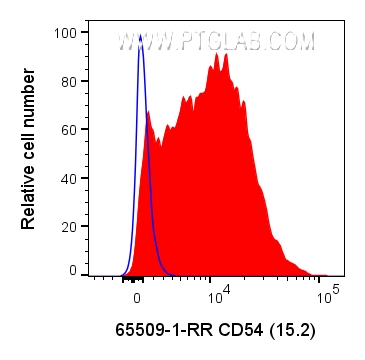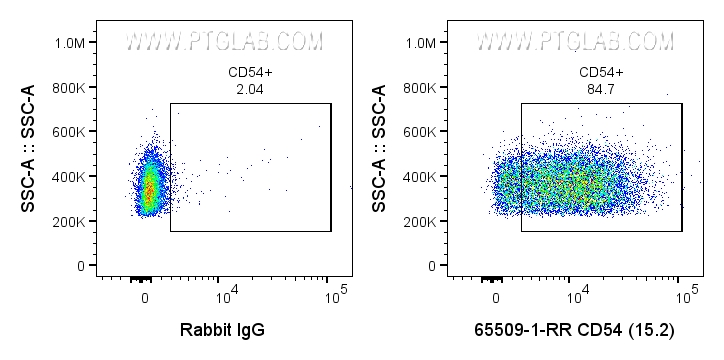验证数据展示
经过测试的应用
| Positive FC detected in | human PBMCs |
推荐稀释比
| 应用 | 推荐稀释比 |
|---|---|
| This reagent has been tested for flow cytometric analysis. It is recommended that this reagent should be titrated in each testing system to obtain optimal results. | |
| Sample-dependent, Check data in validation data gallery. | |
产品信息
65509-1-RR targets ICAM-1/CD54 in FC applications and shows reactivity with human samples.
| 经测试应用 | FC Application Description |
| 经测试反应性 | human |
| 免疫原 | Rheumatoid synovial cells and human monocytes 种属同源性预测 |
| 宿主/亚型 | Rabbit / IgG |
| 抗体类别 | Recombinant |
| 产品类型 | Antibody |
| 全称 | intercellular adhesion molecule 1 |
| 别名 | CD54, ICAM-1, ICAM1, ICAM 1, BB2 |
| 计算分子量 | 90 kDa |
| GenBank蛋白编号 | BC015969 |
| 基因名称 | ICAM-1 |
| Gene ID (NCBI) | 3383 |
| ENSEMBL Gene ID | ENSG00000090339 |
| RRID | AB_3670296 |
| 偶联类型 | Unconjugated |
| 形式 | Liquid |
| 纯化方式 | Affinity purification |
| 储存缓冲液 | PBS with 0.09% sodium azide , pH 7.3 |
| 储存条件 | Store at 2-8°C. Stable for one year after shipment. |
背景介绍
ICAM-1 (CD54) is a 90-kDa transmembrane glycoprotein of the immunoglobulin superfamily and is critical for the firm attachment and transmigration of leukocytes out of blood vessels and into tissues (PMID: 19307690). ICAM-1 is expressed by several cell types, typically on endothelial cells and cells of the immune system, and its expression can be up-regulated by various stimuli, including TNF-α, INF-γ, IL-1 and thrombin (PMID: 3086451; 9694714; 15979056). It is a ligand for LFA-1 and Mac-1, serves as a receptor for rhinovirus, and is one of several receptors used by Plasmodium falciparum (PMID: 2566624; 2538244; 2475784).
实验方案
| Product Specific Protocols | |
|---|---|
| FC protocol for ICAM-1/CD54 antibody 65509-1-RR | Download protocol |
| Standard Protocols | |
|---|---|
| Click here to view our Standard Protocols |


